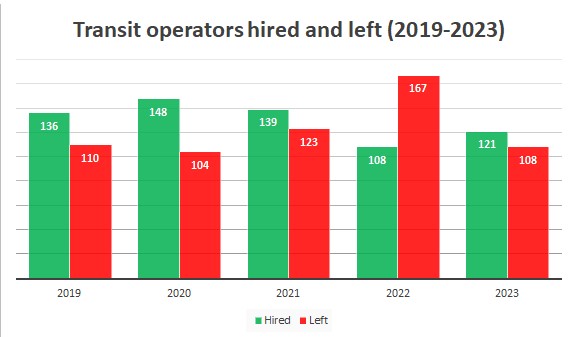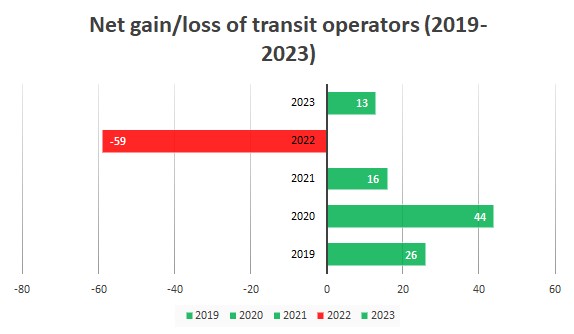What the numbers are saying about Winnipeg Transit’s staffing problem
Posted November 17, 2023 4:56 pm.
Last Updated November 18, 2023 2:32 pm.
More data from the city is showing the degree to which bus operators are leaving Winnipeg Transit, with new numbers showing the agency experiencing a net loss of operators in 2022.
The numbers came after CityNews asked the City of Winnipeg for the rate at which bus operators were hired and leaving over the last four years.
The numbers show Winnipeg Transit is experiencing a net gain of 13 bus operators this year so far after 121 were hired and 108 have left.
The agency experienced a net loss of 59 operators last year, with 108 hired in 2022 and 167 leaving that same year.
The agency also saw the number of operators leave increase year-over-year in 2021 and 2022.
Winnipeg Transit experienced net gains in operators in 2021, 2020, and 2019. In 2021, 139 operators were hired and 123 left, in 2020, 148 operators were hired and 104 left and in 2019, 136 operators were hired and 110 left.


“It’s one of the most difficult jobs to do in Canada right now,” explained Todd Picklyk, a former Winnipeg Transit bus operator. “We’ve had operators who have been assaulted who have had to pick up that exact person who assaulted them the next day.”
Picklyk left Winnipeg Transit in 2021. He originally planned on leaving when he was 55 years old but left when he was 53.
He says transit operators not only are not paid enough for the safety risks they deal with on an ongoing basis, but he says they also don’t feel supported by management.
“I’ve heard of cases where a bus operator stopped for a six-minute washroom break and he was called up by his supervisor. His supervisor told him six minutes was too long and he tried to dock him four minutes worth of pay. That’s not uncommon at Winnipeg Transit.”
Picklyk says the city’s stats don’t surprise him, with many having problems working at Winnipeg Transit for the last few years.
“Everyone is getting out as early as possible. When I first started, we would ask the senior operators, ‘How long are you going to stay?’ They all said, ‘Till whenever. I love this job.’ It’s absolutely changed over the last 20 years. Everyone is just getting out as quick as they can,” said Picklyk.
The City of Winnipeg tells CityNews that they are working with operators regarding their security concerns and are also streamlining their hiring process.
The agency also said in a statement to CityNews regarding their hiring efforts that they will be “increasing outreach by making more concerted efforts to increase our presence in the community, including connecting with culturally-specific organizations that support newcomers.”
ATU Local 1505, the union that represents Winnipeg Transit workers has been calling for better collaboration with all levels of government to adequately fund Winnipeg Transit.
Those calls included a request for the provincial government to bring back the 50-50 cost-sharing agreement between the province and the City of Winnipeg that covers operational costs.
It also includes an ask for the federal government to give part of the money collected from the carbon tax to create a national transit strategy to deal with the recruitment and retention issue transit agencies are facing across the country.
“If the transit system is going to succeed, we need to attract people who are willing to stay for the time period,” said Chris Scott, President, and Business Agent for ATU Local 1505.
In a statement to CityNews, the provincial government said it is working on distributing a previously announced one-time payment of $13.4 million among transit agencies in Winnipeg, Brandon, Thompson, Selkirk, and Flin Flon.
The statement went on to say that “Manitoba is also committed to bring in a multi-year funding model for municipalities so they can count on reliable funding for programs, infrastructure and maintenance.”
The federal government told CityNews in a statement that “Environment and Climate Change Canada will return approximately $2.5 billion in fuel charge proceeds as direct payments to eligible emissions-intensive, trade-exposed small and medium-sized enterprises (EITE SMEs) in Alberta, Saskatchewan, Manitoba, and Ontario,” under its Fuel Charge Proceeds Returns Program.








